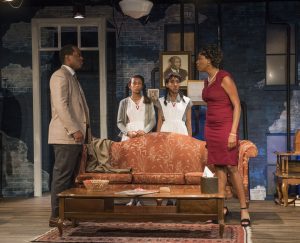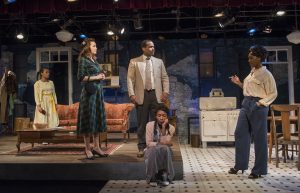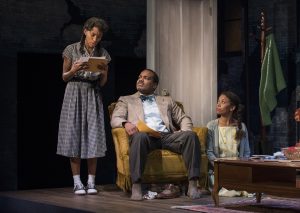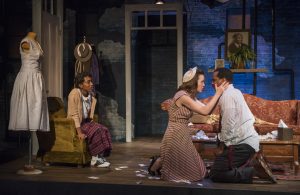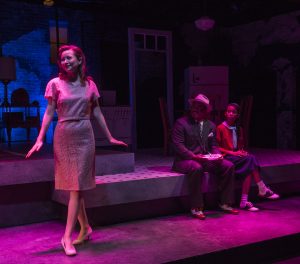CRUMBS IS A RICH MEAL
Much like Lorraine Hansberry and Tennessee Williams, Lynn Nottage is a memory-monger. She sees truth in small stuff that looms larger later. And as with Arthur Miller or Clifford Odets (especially the latter’s Awake and Sing!), she also has the gift of moral magnification: She can make family feuds stand for much more than hurt feelings and wounded egos. What seem like lesser divides among Nottage’s Crump family are in fact the same fissures running through the entire country.
Characteristic of all these strengths, Nottage’s 1995 domestic drama Crumbs from the Table of Joy, first produced in Chicago by Steppenwolf Theatre in 1996, is, like The Glass Menagerie, a not-so-loved one’s anguished recollections reclaimed in flashbacks.
Well restored in a Raven Theatre staging by Tyrone Phillips, this 150-minute two-act depicts the self-narrated coming-of-age tale of 17-year-old Ernestine Crump (likable and beautifully named Chanell Bell). She’s a teenager in transit whose family moved from Florida to Brooklyn in the fall of 1950 to give her and her younger sister Ermina (a very vulnerable Brandi Jiminez Lee) a fairer start in life.
The mother is gone but still haunts their cramped walk-up: The father Godfrey (Terence Sims, convincingly torn) seeks solace and certainty from radio evangelist Father Divine. He hopes this holy roller will provide heavenly answers to his earthly travails, including poor pay at a bakery. Faith, Godfrey trusts, will provide the freedom that America has not.
Into Ernestine’s too-settled household bursts a force of nature from Harlem called Lily Anne Green (Brianna Buckley, detonating as much as acting), ready to move in — in more ways than one. Godfrey’s visceral opposite, this earthy dame, the sister to his late wife, is a hard-drinking, oversexed, Communist crusader, entrenched in racial politics and class warfare. Suddenly, a whole lot of shaking is going on as father and aunt, polarized mentors, in effect contend for the sisters’ solidarity.
Exacerbating the mix is the unexpected (and seemingly improbable) advent of Gerte Crump (Emily Tate, so much sweetness to whatever sourness surrounds her). She’s a German girl — lost in New York as she travels to New Orleans — who Godfrey meets on the subway and persuades to marry him. (As effectively as she fits Nottage’s scheme of things, Gerte still feels like an experimental ploy to subvert and disrupt an already disputatious play.)
Soon to be the first to graduate from high school, “Ernie” is retroactively wise to her own rites of passage: As she remembers out loud, she reflexively compares her family’s fears, failures and resilience to what happens in the movies she loves. In one magically realistic moment, she conjures up a conga between Lily and Gerte that, alas, never happened.
At the risk of verging on melodrama, Nottage can stir up a strong stew. Industriously, she tosses together pungent ingredients: A sudden infusion of racial tension in open-hearted Gerte’s unsought white privilege (she is no racist); the sexual rivalry between the “bewitching” but secular sister-in-law and a very different interloper; and agitating Lily’s contempt for Godfrey’s opium-like religiosity. All are family frictions, the flashpoints of which signal seminal changes in postwar America.
By play’s end this crowded flat mirrors both culture clashes and psychological schisms. Nottage fleshes out the chronic challenges of dreamers clinging to mutually exclusive creeds that promise very different futures. Which will Ernestine choose in the movie she’s making of her life?
Nottage seems better at exposing familial ruptures than suggesting any whole that’s greater than the turmoil itself. (This is especially true with Godfrey’s truncated spiritual odyssey.) Happily, there’s enough bedrock authenticity in her diagnoses to make up for a lack of urgency to sort stuff out.
Phillips’ direction warmly registers the script’s creative confusions. Five actors deliver hard-won believability, no matter how schematic the scene-spinning. It’s wonderful how theater, delivering shocks of recognition across nearly 70 years and assorted racial and cultural divisions, can hit us where, and in who, we are. Sometimes “crumbs” are quite enough.
photos by Michael Brosilow
Crumbs from the Table of Joy
Raven Theatre Company, 6157 N. Clark St. (at Granville)
Thurs-Sat at 7:30; Sun at 3
ends on November 18, 2018
for tickets, call 773.338.2177 or visit Raven Theatre
for more, visit Theatre in Chicago

